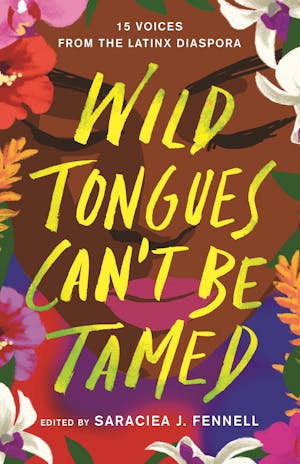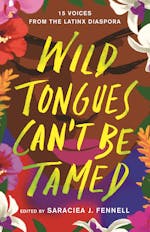Eres Un Pocho
Mark Oshiro
Eres un pocho.
You are seven.
They will ask you many questions. Why is your hair like that? Why are your eyes so dark? Are you a demon? How come you are so tan? There are no beaches in Idaho!
You will assure them every time that you are just like them.
You will look in the mirror and know you are not.
Your teacher will point to places on a map, one with borders drawn in black, countries and states filled with bright colors, and she will point below your country to another, and when she asks your class what it is, a young white girl will point at you. You will tell them you are not Mexico.
(You say this out of disbelief. But you will later know that this is the first time you associate shame with this thing you don’t understand.)
They will stare back, eyes wide, foreheads crinkled in confusion, and your teacher will say, “When was the last time you ate a taco?”
You have never had one.
(Not a real one, at least. You know the ones at Taco John’s are bland, without seasoning, without heart.)
You say nothing.
You will disappear into yourself.
* * *
Eres un pocho.
You are eight.
You are outside Adelanto, a town you’ve never been to before, one you will later pass on the highway twenty years later and recall this memory all over again. Your whole life has been uprooted, and what few friends you had will fade away. Years later, you will be unable to recall their names. You have been in the van for hours, your bladder full. Mom has barked at you enough times that you have learned how to ignore the pain down below. You are used to not being believed.
There is snow on the distant mountains. You don’t know if this is the last time you’ll see it. (It’s not.) You’ve been told that where you are headed is hot. Arid. Dry. It is nothing like Boise. You will later learn just how true this is.
The hotel is small and smells of age and antiseptic. You are carted to a restaurant nearby that promises authentic Mexican cuisine. You wonder if it is anything like the bland imitations you have eaten before.
The staring starts almost immediately and you are used to it. You have adapted to what happens when you walk into any space with your family. People will glance from you to your parents and back, then to your blond, green-eyed sister, then back to you and your twin. You have years of experience with the dismay that crosses their faces—you know what it is like to have someone look at you and communicate a simple message:
You do not make sense.
You have known you were adopted for a long time. There was no way to hide it: a white mother and a dark-skinned Japanese father born in Hawaii. You never even got to be curious about it. You were told early, and you made it part of who you were. But you learn not long after that first conversation that knowing you are adopted does not help other people understand you. So you will become used to the odd expressions on the faces of strangers, the way that people will make you feel like an anomaly, like an exhibit in a zoo.
That does not happen this time. As the waitress brings out a hot plate piled with yellow rice, steaming and flavorful, the grains spilling over into the dark brown frijoles, she lingers. Her hair is dark like yours. Her eyes are dark like yours. You have never seen anyone else like this before.
(Only when looking at your twin or in the mirror.)
(This is often not enough.)
She stares at you and your brother. Then at your parents, one pale, the other dark, then glances back at you.
And then when she makes eye contact, she hits you with it, something you won’t understand for years, but when you do, so much of your childhood will make sense.
It’s pity. She wears it on her face as she leaves, and you scoop up some of the frijoles into your mouth, and they taste nothing like you’ve had before. You are savoring this experience when you look up and see the waitress. She points in your general direction.
No, you realize, that isn’t quite right.
She is pointing you out to the cook.
The one who also looks like you.
He shakes his head. You won’t understand this for a while.
You just eat.
It is delicious.
You will be surrounded by people who look like you soon. It will overwhelm you. It will be like a piece of the puzzle that is your sense of self falling into place. Just one piece, though. You still need many others.
You will see it as a blessing.
Your mother will see it as a curse.
* * *
Eres un pocho.
You are nine.
Those words are uttered all the time. You ask what they mean. No one will tell you. The kids who surround you, who speak Spanish rapidly and proudly, will titter and giggle and refuse to answer. “¡Eres un pocho!” they cry. They laugh. They run away from you. No one wants to be your friend.
You don’t know what that word is.
You just know it hurts.
You will turn in a spelling quiz.
You will get it handed back.
She will put it face down on your desk.
Smile.
And say:
“I didn’t expect you to be so smart!”
The corners of her mouth will upturn in what she thinks is a smile.
You know—even back then—that it is a slap in the face.
* * *
Eres un pocho.
You are twelve.
Middle school often feels like a waking nightmare. You are outgrowing your clothes, but your mother will refuse to buy you anything new. She will tell you it is because of money. That is probably true—your family has never had much of it. But it is also because the current style of dress in your school involves baggy, oversized clothing. As your jeans become tighter and tighter, the kids around you will turn on you.
You should ignore them. They are just as messed up, unsure, and afraid as you are.
But you won’t. There is a boy, though. Carlos. You will later realize that he is the first person you will fall for. It is not love—that won’t happen for a long time. Love can’t exist without reciprocity. While you two will strike up a friendship over music, he will later betray you, too, when Kelly breaks up with you after a week. She will tell everyone she had to because you’re gay.
You don’t have the courage (yet) to own that truth. Instead, the truth is only another thing that sets you apart.
Before that happens, though, Carlos rips a split for you. He hands you a cassette at lunch. Los Crudos and Manumission. Five songs. You hide it under your mattress as if it is illicit material.
(In your house, it is.)
You check out a Spanish dictionary from your junior high library.
You start learning. So many things begin to make sense, to have a clarity they did not before.
You practice the words at home, late at night, while the lights are out and your parents think you are asleep. You cannot seem to roll your R’s, at least not the first hundred times or so. It is as if your tongue is made of lead, as if someone has cast it in iron.
(Someone has. Something has. You won’t know what just yet.)
(Hold on.)
You start to ask questions at home. Who were your parents? Why don’t we talk about them?
You will not get any answers.
Ever.
* * *
Eres un pocho.
They will still call you this.
You still won’t get it.
(Soon.)
Even though you know what it literally means: you gave up your culture. You assimilated. You threw away everything so that you could fit in here, in a country that wants monotony. You try to explain that you didn’t give up anything, that it was taken from you, but this doesn’t matter to them. You betrayed who you were.
You will try. Because that’s what you do: You try harder than anyone. People notice this, not always in the best light.
You will not fit in.
(Yet.)
You will keep trying.
Copyright © 2021 by Saraciea J. Fennell
Copyright © 2021 by Mark Oshiro. Copyright © 2021 by Naima Coster. Copyright © 2021 by Natasha Díaz. Copyright © 2021 by Meg Medina Books, Inc. Copyright © 2021 by Julian Randall. Copyright © 2021 by Saraciea J. Fennell. Copyright © 2021 by Ibi Zoboi. Copyright © 2021 by Cristina Arreola. Copyright © 2021 by Kahlil Haywood. Copyright © 2021 by Zakiya N. Jamal. Copyright © 2021 by Lilliam Rivera. Copyright © 2021 by Jasminne Mendez. Copyright © 2021 by Ingrid Rojas Contreras. Copyright © 2021 by Janel Martinez. Copyright © 2021 by Elizabeth Acevedo.





